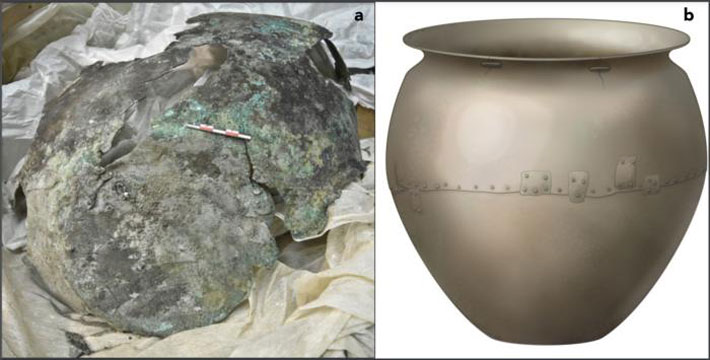 ZURICH, SWITZERLAND—According to a statement released by Cell Press, researchers led by Shevan Wilkin of the University of Zurich analyzed eight residue samples taken from seven bronze cauldrons unearthed at burial sites in the Caucasus. The cauldrons would have been rare items, likely to have been owned by elite members of society, Wilkin said. These cauldrons had been heavily used and extensively repaired. Samples of soot on the cauldrons were radiocarbon dated to between 3520 and 3350 B.C. The antimicrobial properties of the metal alloy helped to preserve the residues, she added. The study suggests that people cooked blood, muscle, and dairy products from deer, sheep, goats, and members of the bovine family, such as cows, yaks, and water buffalo. “This is the first evidence we have of preserved proteins of a feast,” Wilkins explained. “They were obviously making large meals, not just for individual families,” she concluded. To read about a third-century B.C. burial of a warrior uncovered in the Caucasus Mountains, go to "Hail to the Bождь (Chieftain)."
ZURICH, SWITZERLAND—According to a statement released by Cell Press, researchers led by Shevan Wilkin of the University of Zurich analyzed eight residue samples taken from seven bronze cauldrons unearthed at burial sites in the Caucasus. The cauldrons would have been rare items, likely to have been owned by elite members of society, Wilkin said. These cauldrons had been heavily used and extensively repaired. Samples of soot on the cauldrons were radiocarbon dated to between 3520 and 3350 B.C. The antimicrobial properties of the metal alloy helped to preserve the residues, she added. The study suggests that people cooked blood, muscle, and dairy products from deer, sheep, goats, and members of the bovine family, such as cows, yaks, and water buffalo. “This is the first evidence we have of preserved proteins of a feast,” Wilkins explained. “They were obviously making large meals, not just for individual families,” she concluded. To read about a third-century B.C. burial of a warrior uncovered in the Caucasus Mountains, go to "Hail to the Bождь (Chieftain)."
Protein Residues in Bronze Age Cauldrons Analyzed
